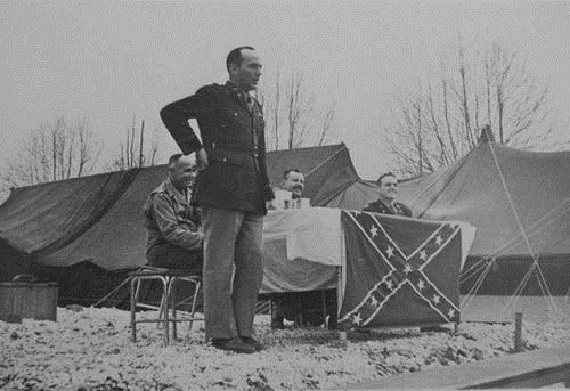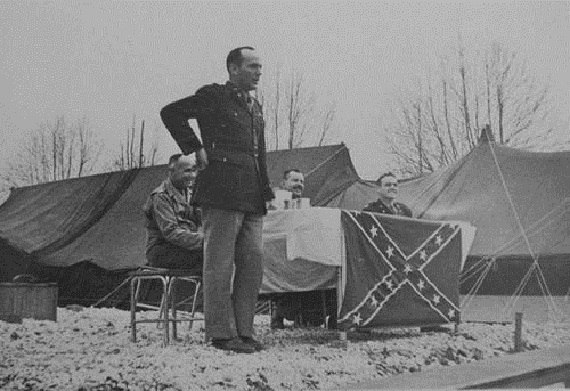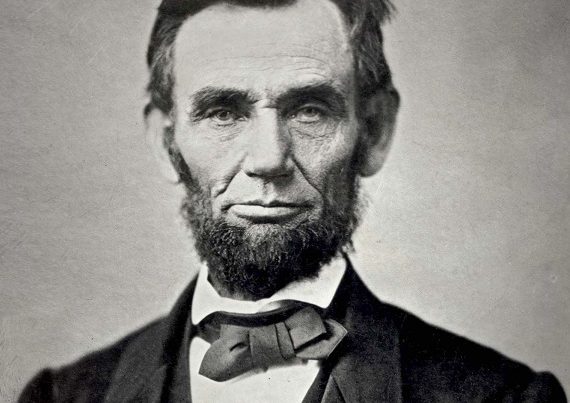(3rd in a 5-part series)
Hollywood’s treatment of Southerners in the vast output of World War II movies is a mixed bag. There is a fair amount of favourable portrayal of Southerners. This doubtless reflects the good will with which the American public entered the war and its recognition that we were needed and doing our part or more. On the other hand, war movies also exhibited a relentless buildup of hostility to Southerners. This was doubtless due to the increasing control of Hollywood content and slant from the 1930s on by Communists, many of them European immigrants.
Such people know nothing about the South but find it to be the part of the U.S. that is most alien to them and which has been their first target in their ongoing decimation of all American heritage. (I once heard the New York Communist Arthur Miller in an interview engage in a diatribe against the South, in which he thought that Wilmington, which he had evidently visited, is in South Carolina.) The hostility has continued to the present when every irredeemable criminal can be expected to have a Confederate flag and a Southern accent—even when it is ludicrously inappropriate to the circumstances.
Confederate emblems and Southern accents appear fairly often in World War II cinema. The willingness of Northerners and Brits to play sympathetic Southern characters has carried over from earlier days even up to the near present. Here are some samples, by no means an exhaustive account.
Colonel Effingham’s Raid, set in Georgia at the beginning of World War II, makes it abundantly clear that the Southern flag and anthem were very much considered a part of American patriotism in 1946.
Henry Fonda in the John Wayne epic, In Harm’s Way, does a perfect Southern accent as the wise old top admiral, perhaps meant to be suggestive of Nimitz. In another Wayne war production, Operation Pacific, Duke goes out of his way to praise the Southern sailors in the fighting Navy and show the Confederate flag of one who is a casualty.
In The Enola Gay, President Truman, considering whether to drop the atomic bomb on Japan, is seated in front of an array of flags, one of which is Confederate, or possibly a Mississippi or Georgia flag.
Jim Caviezel (from Washington State with Swiss background) plays a good Southerner with a perfect accent in the second movie version of James Jones’s The Thin Red Line. Caviezel is of course the fine actor who was blacklisted by official Hollywood for his role in Mel Gibson’s Passion of the Christ.
Pearl Harbor (2001), quite surprisingly to anyone who has observed Hollywood products lately, has as its central heroes two pilots from Tennessee. They are played by non-Southerners Ben Affleck and Josh Hartnett with well-done accents, especially the latter.
An Italian film, War Devils (1969) has American soldiers whistling “Dixie” as a signal. In G.I. Joe a soldier plays “Dixie” on his harmonica on the road to liberate Rome.
In the miniseries The Pacific, billed as the Pacific theatre version of the European Band of Brothers, Southerners are treated fairly. The Marine hero Chesty Puller appears with a correct Virginia accent as does Alabamian Eugene Sledge. The latter is only natural since the series is based in part upon Sledge’s memoir of service with the 1st Marine Division. Both Puller and Sledge are portrayed by non-Southerners.
Overall, I suspect that Southerners are somewhat under-represented in World War II combat stories. It is said that the Brits referred to the U.S. air arm as “the Royal Texas Air Force,” and that one of the insults shouted by the Japs before a banzai charge was “To Hell with Roy Acuff.” In many World War Two movies one gets the impression that most of the fighting was done by short, dark ethnics with Brooklyn accents. That does not square with the authentic photos and films from the time, which show mostly tall lads from the Heartland, the South, and the West.
On the downside there is a whole library of World War II movies in which Southerners are portrayed as ignorant bumpkins or as vicious and incompetent officers, whose deadly misdeeds have to be corrected by wise and heroic Yankees or minorities. The Bridge at Remagen, Between Heaven and Hell, Attack!, and the most recent version of The Thin Red Line, where Texan Nick Nolte portrays one of those evil Southern officers, fit the latter category. In Objective Burma! and Away All Boats! the only Southerners who appear are hopeless bumpkins. In Battleground, which is about the Battle of the Bulge (in which my North Carolina uncle was killed), the only Southerner is a tacky, loutish fellow named “Abner.” I’ll bet that name is a lot more common in New England than in the South.
In A Walk in the Sun, often cited as a great war movie, the only Southern soldier is portrayed as stupid and the good soldiers are from Rhode Island, Brooklyn, Jersey City, and Ohio. Interesting since the movie concerns what is known as the Texas Division. This travesty was directed by “Lewis Milestone,” who was one of the New Immigrants from Russia.
The same can be said of another touted World War II flick, Guadalcanal Diary, where the only Southerner is a fool, although he is a good marksman. The behavior of the Marines and the combat scenes are ridiculously unreal. The director, from New York, did not have a clue. Fortunately, in Gung Ho!, North Carolinian Randolph Scott is a brave and skillful and unquestionably Southern Marine leader. Yet the film nods toward an anachronistic multiculturalism and pro-Communist propaganda.
In Memphis Belle, the Hollywood version of the story of a famous World War II bomber, (which, after all, was not named the “Cleveland Playmate”), there is one Southerner in the crew. He is the tail-gunner, said to be from Louisiana where he father lost the family farm in a poker game and where he used to play music in a house of ill repute. No such person existed, but it is notable that the idea of Southerners as colorful characters and good shots recurs. In the celebrated Saving Private Ryan there is also only one Southerner in the central group. He is somewhat crazy but a good shot. If they know in Hollywood that we are good shots, you would think they would watch what they say a little more. Clearly they feel free to play around with our identity in a way they would with no other folk.
World War I American cinema is less abundant and I admit I know less about it. I note that the celebrated biopic Sergeant York, about the most decorated soldier of the war, is respectful, if a little condescending, toward the hero’s Tennessee mountain background. The star Gary Cooper is said to have been coached on the accent by Randolph Scott. When York comes back to America, the landing at New York is greeted by bands playing “Dixie.” Less successful, I think, is To Hell and Back, in which Audie Murphy plays himself as the most decorated soldier of World War II. It is really not a very good film, and his Texas background is a replay of the familiar backward Southern sharecropper theme. Except the people all act and talk like they were from Iowa.
For the Korean War I might note in passing Men of the Fighting Lady (1954) in which Keenan Wynn has a Confederate emblem on his fighter plane and a Southern flag at his funeral.
By the time of the Vietnam War, America had one foot in another era. Yet in a number of films I have noted fighting men with Confederate symbols. The television series China Beach may be the best and most balanced treatment of the Vietnam war experience. Even though at times it seems more about advocating civil rights and affirmative action than about the war, soldiers now and then realistically have Confederate flags and Southern accents without arousing any negative implications.
As to the future: The music of World War II, Korea, and Vietnam was country with a little old-fashioned pop. The music of our military ventures since Vietnam seems to be rap and in Hollywood’s treatment multiculturalism is in full bloom. An exception is Blackhawk Down, about the Somaliland disaster. No concessions are made to portraying the Army Rangers in the interest of affirmative action, and there is a subtle lesson given that probably few have noticed. The most featured Northern soldier sees his mission in the backward and war-ravaged country as doing good. Another soldier, played by the Australian Eric Bana with a perfect Southern accent, quietly knows better. He is a warrior doing his duty without illusions. Of course, Blackhawk Down was created by a Brit, Ridley Scott. No American could have or would have done it that way.







